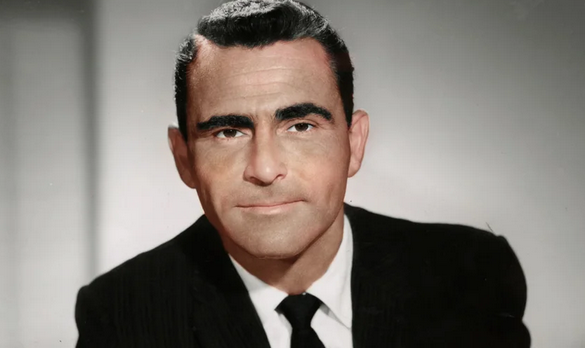Rod
Rod Serling.
He has been called TV’s 'Last Angry Man'. He was one of a rarefied few who was considered a playwright from his plays appearing exclusively on live television. He started in radio, a hungry writer who won a script contest for the radio show 'Dr. Christian' ('The Show YOU Write'). He'd served in WW2 as a paratrooper and suffered from nightmares the rest of his life, and a survivors guilt that drove much of his work. He outlined the problems and rebelled against the 1950s sensibilities of the day, against the corporate and uniform push; he wrote about people who felt the crush, felt the shove towards the edge.
Serling, growing sick and weary of the pettiness of the network censors (they stripped all content and context from his script based on the Emmet Till murder, among many others) he decided the only way to escape the insanity of the censors and sponsor demands was to leave the live dramas and go into science fiction, to put his feelings about the world and society into the mouths of Martians and outcasts.
And he got away with with it.
For a while.
He was a brave, irascible, angry, loyal man and incredible writer. He smoked too much, worked way too hard, maybe trusted too much and lived as big as he could. He was a loving dad, a funny and smart companion, and honest, even about himself.
He's been a hero of mine since I was a kid. I even wrote my own episodes of the Twilight Zone, working up a Serling impersonation I later used on radio. He's often in the back of my mind as I write. I was thinking of him again today, as I read over a novel I'm pecking slowly out. He was brilliant, able to cut to the heart of a character and reveal their humanity in just a few lines. It didn't matter if they were aliens, time travelers, or the devil, they were always people trying to make their way upstream in a down stream world. Serling worked fast, dictating his scripts (you can tell when he was rushed or tired on some of these, as it sounds like two Serlings talking to one another) and sending it off to the typist, and then on to the next. He had to work fast in TV, which sometimes hurt his work. The headlong rush over taking true inventions. Still, so much good was there, so much heart and passion. An it was his heart that failed him, in 1975.
Make no mistake, I think Serling was a genius. Today, as I type these paltry words, I celebrate him for no other reason than I think he deserves it.
Thank you Rod. Thank you for the work, for the life, for the heart.

